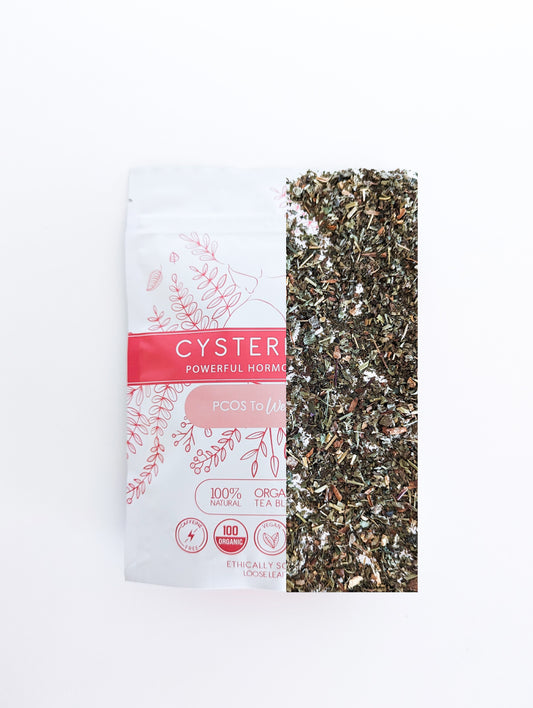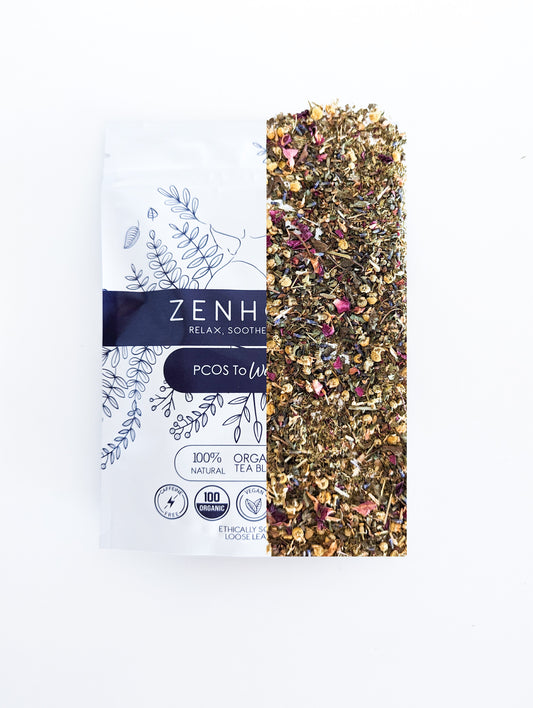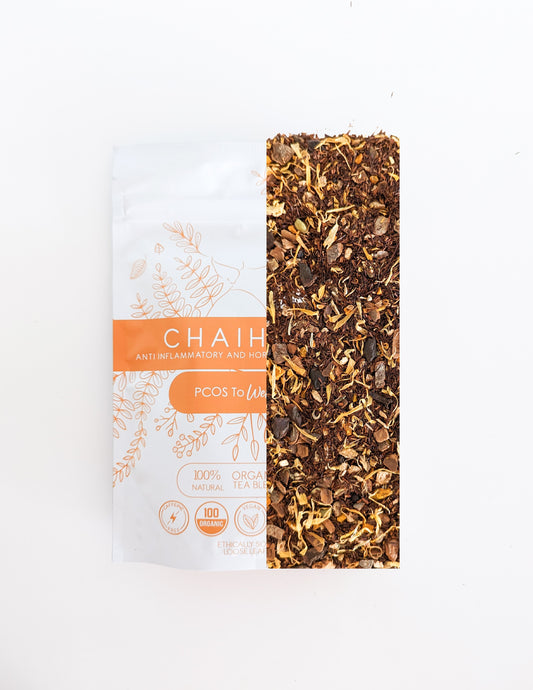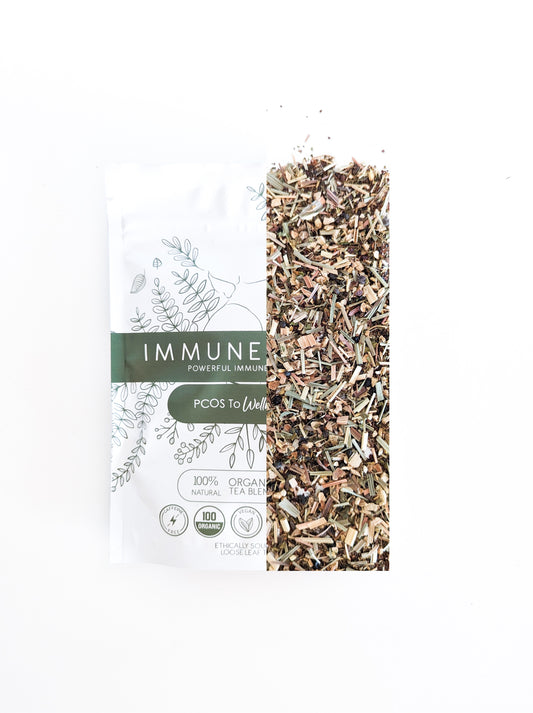The BEST and FASTEST Ways to Manage and Reverse insulin Resistance PCOS Naturally
Share
The BEST and FASTEST Ways to Manage and Reverse Insulin Resistance PCOS- Naturally

Did you know up to 70% of women with PCOS also deal with insulin resistance? So it no wonder so many of us are looking for ways to help with this.
Managing and reversing insulin resistance is crucial for MANY women with Polycystic Ovary Syndrome (PCOS). Insulin resistance not only contributes to weight gain but also exacerbates hormonal imbalances, making PCOS symptoms worse. Here are ten simple, effective, and natural ways and lifestyle changes to help manage and reverse insulin resistance, along with insights into the specific herbs in our best selling herbal teas and supplements that can help support this process faster.
1. Adopt a Low-Glycaemic Diet
A low-glycaemic diet focuses on consuming foods that have a low glycaemic index (GI), which means they cause a slower and smaller rise in blood glucose levels. This approach is particularly beneficial for managing insulin resistance, as it helps to stabilise blood sugar levels and reduce insulin spikes.
Key Components of a Low-Glycaemic Diet:
- Whole Grains: Instead of refined grains like white bread and pasta, opt for whole grains such as quinoa, brown rice, oats, and barley. These have a lower GI and provide more fibre, which helps slow down glucose absorption.
- Legumes: Beans, lentils, and chickpeas are excellent sources of protein and fibre, making them great for maintaining stable blood sugar levels.
- Vegetables: Non-starchy vegetables like broccoli, spinach, kale, and peppers are low in carbohydrates and rich in fibre, vitamins, and minerals. They have minimal impact on blood glucose levels.
- Fruits: Choose fruits with a lower GI such as berries, apples, pears, and cherries. These fruits are less likely to cause significant blood sugar spikes compared to high-GI fruits like watermelon and pineapple.
- Healthy Fats: Incorporate sources of healthy fats, such as avocados, nuts, seeds, and olive oil. These fats do not raise blood sugar levels and can help improve insulin sensitivity.
Foods to Avoid:
- Refined Carbohydrates: Foods like white bread, pastries, and sugary cereals can cause rapid spikes in blood sugar levels.
- Sugary Snacks and Beverages: Limit intake of lollies, soft drinks, and other sugary drinks, which can lead to insulin spikes and contribute to insulin resistance.
- Processed Foods: These often contain hidden sugars and unhealthy fats that can negatively impact blood sugar levels and overall health.
Including protein and healthy fats in every meal can help stabilise blood sugar levels and improve insulin sensitivity, which is essential for managing PCOS symptoms.
Benefits of Protein:
- Stabilises Blood Sugar: Protein slows down the absorption of carbohydrates, preventing sudden spikes and crashes in blood sugar levels. This helps maintain a steady release of energy throughout the day.
- Reduces Appetite: Protein is more satiating than carbohydrates or fats, helping to control hunger and reduce overall kilojoule intake, which can aid in weight management.
- Supports Muscle Maintenance: Adequate protein intake supports muscle mass, which is important for metabolic health and insulin sensitivity.
Sources of Protein:
- Animal Proteins: Include lean meats such as chicken, turkey, and fish, as well as eggs and low-fat dairy products.
- Plant Proteins: Incorporate beans, lentils, chickpeas, tofu, tempeh, and quinoa into your meals. These are excellent sources of plant-based protein and fibre.
Benefits of Healthy Fats:
- Improves Insulin Sensitivity: Healthy fats, particularly omega-3 fatty acids, have anti-inflammatory properties that can improve insulin sensitivity.
- Supports Hormone Production: Fats are essential for the production of hormones, including those involved in blood sugar regulation.
- Provides Satiety: Fats help keep you feeling full and satisfied, reducing the likelihood of overeating.
Sources of Healthy Fats:
- Monounsaturated Fats: Found in avocados, olive oil, and nuts like almonds and walnuts.
- Polyunsaturated Fats: Found in fatty fish like salmon and mackerel, as well as flaxseeds, chia seeds, and walnuts.
- Omega-3 Fatty Acids: Found in fish oil supplements and fatty fish. Omega-3s are particularly beneficial for reducing inflammation and improving insulin sensitivity.
3. Exercise Regularly
Engage in regular physical activity, such as brisk walking, swimming, or yoga. Aim for at least 150 minutes of moderate-intensity exercise per week. Exercise helps reduce insulin resistance and supports overall hormonal balance.
4. Stay Hydrated
Drinking enough water is essential for maintaining optimal health and metabolic function. Aim for at least 8-10 glasses of water per day. Proper hydration can improve insulin sensitivity and aid in weight management.
5. Prioritise Sleep
Quality sleep is crucial for hormone regulation and insulin sensitivity. Aim for 7-9 hours of uninterrupted sleep each night. Create a relaxing bedtime routine and avoid screens before bed to improve sleep quality.
6. Reduce Stress Levels
Chronic stress can worsen insulin resistance. Incorporate stress-reducing activities like meditation, deep breathing exercises, and spending time in nature. Practices such as mindfulness and yoga can also help lower stress levels and improve insulin sensitivity.
7. Avoid Processed and Sugary Foods
Limit your intake of processed foods and sugary snacks. These foods can cause blood sugar spikes and contribute to insulin resistance. Opt for whole, natural foods instead.
8. Try Apple Cider Vinegar
Consuming apple cider vinegar before meals can help improve insulin sensitivity and lower blood sugar levels. Mix one to two tablespoons of apple cider vinegar in a glass of water and drink it before meals.
9. Drink Hormone-Balancing Teas
Certain herbs (all found in our hormone-balancing teas!) have been shown to help manage insulin resistance and support overall hormonal health. Here are some of the key herbs and their benefits:
- Ceylon Cinnamon: As mentioned, ceylon cinnamon helps improve insulin sensitivity by slowing the breakdown of carbohydrates in the digestive tract and improving glucose uptake by cells. Just make sure its ceylon cinnamon (not the supermarket kind!) Found in Cysterhood tea
- Ginger: Known for its anti-inflammatory properties, ginger can help reduce oxidative stress and improve insulin sensitivity. It also aids in digestion and supports overall metabolic health. Found in Cysterhood tea , Immunehood and Bumphood
- Turmeric: Curcumin, the active compound in turmeric, has powerful anti-inflammatory and antioxidant effects. It can enhance insulin sensitivity and reduce blood sugar levels by modulating inflammatory pathways. Found in Chaihood
- Fenugreek: Fenugreek seeds contain soluble fibre, which helps slow the absorption of carbohydrates and sugars. This can lead to improved blood sugar control and enhanced insulin sensitivity. This is also one of the few herbs that is safe to take while breastfeeding. Found in our Mamahood tea.
- Holy Basil (Tulsi): Holy basil has adaptogenic properties that help reduce stress, a known factor in insulin resistance. It also supports glucose metabolism and helps maintain balanced blood sugar levels. Found in Zenhood
- Liquorice Root: Liquorice root has anti-inflammatory and antioxidant properties. It can help improve insulin sensitivity and support adrenal health, which is crucial for managing stress and hormonal balance. Found in Chaihood
- Spearmint: Spearmint has been shown to reduce androgen levels and improve insulin sensitivity, making it beneficial for women with PCOS. Found in Cysterhood tea
- Raspberry Leaf: Rich in vitamins and minerals, raspberry leaf helps support overall reproductive health and can aid in stabilising blood sugar levels. This one is also safe in the later stages of pregnancy and postpartum/ breastfeeding Found in Cysterhood tea , Mamahood and Raspberryhood

Supplements to Support Insulin Resistance
In addition to dietary and lifestyle changes, certain supplements can also help manage and reverse insulin resistance. Here are some supplements to consider:
-
Inositol (Myo-Inositol and D-Chiro-Inositol): Inositol, particularly in the forms of Myo-Inositol and D-Chiro-Inositol, has been shown to improve insulin sensitivity and reduce blood sugar levels in women with PCOS. It also supports ovarian function and can help regulate menstrual cycles.
-
Chromium: Chromium is a trace mineral that enhances the action of insulin and can help improve blood sugar control. Chromium picolinate is a common form used in supplements.
-
Magnesium: Magnesium plays a crucial role in glucose metabolism and insulin action. Supplementing with magnesium can help improve insulin sensitivity and reduce blood sugar levels.
-
Alpha-Lipoic Acid: This antioxidant helps improve insulin sensitivity and reduce inflammation. It also supports nerve health and can help manage symptoms of diabetic neuropathy.
-
Vitamin D: Vitamin D deficiency is common in women with PCOS and has been linked to insulin resistance. Supplementing with vitamin D can help improve insulin sensitivity and overall metabolic health.
-
Omega-3 Fatty Acids: Found in fish oil and flaxseed oil, omega-3 fatty acids have anti-inflammatory properties and can help improve insulin sensitivity. They also support cardiovascular health.
-
N-Acetylcysteine (NAC): NAC is an antioxidant that helps reduce oxidative stress and improve insulin sensitivity. It also supports liver function and detoxification.
-
Probiotics: Gut health plays a significant role in insulin sensitivity. Probiotic supplements can help balance gut bacteria and improve metabolic health.
-
Zinc: Zinc is involved in insulin production and glucose metabolism. Supplementing with zinc can help improve insulin sensitivity and support









